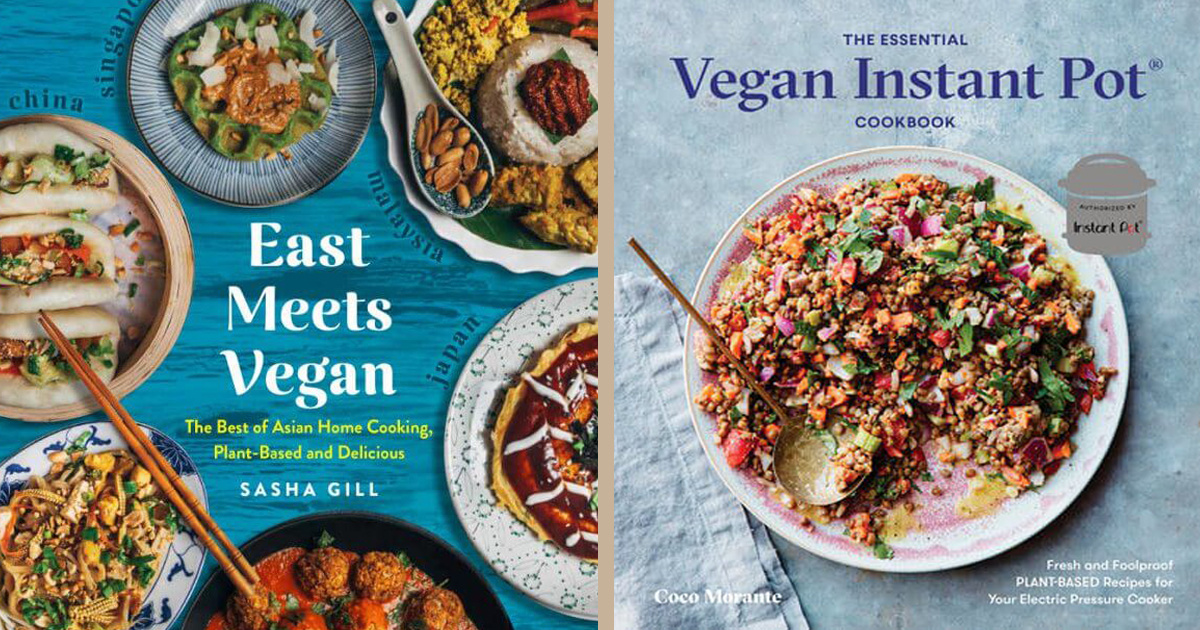

Vegan chefs are currently creating the most innovative, gorgeous food imaginable. You can experience this deliciousness at restaurants, but it’s equally exciting to try vegan chefs’ culinary magic in our own homes. And this, folks, is why we’ve put together a list of the most anticipated vegan cookbooks of 2019.
The staggering number of vegan cookbooks released in the
past couple of years has helped usher vegan cooking into the mainstream, and this coming year promises more of the scrumptious same. It’s never been easier to do right by animals, the environment, and your health.
Without further ado, here’s a taste of some vegan cookbooks that will be released in 2019:
This scrumptious book covers some of our favorite types of cuisine, such as Indian, Italian, Mexican, Vietnamese, and more.
You never knew that your Instant Pot could be used in 75 different ways? This cookbook shows you how to put your favorite gadget to better use.
3. Incredible Vegan Ice Cream: Decadent, All-Natural Scoops at Home by Deena Jalal
The author of this cookbook (and owner of the
FoMu ice cream shops in Boston) shares her special coconut milk–based ice cream recipe that uses whole ingredients and natural sweeteners. All the recipes are vegan and allergy-friendly.
[instagram https://www.instagram.com/p/BpM1QvVloXg/?utm_source=ig_embed expand=1]
4. I Can Cook Vegan by Isa Chandra Moskowitz
Restauranteur and chef
Isa Chandra Moskowitz releases cookbooks at a rapid pace, each one as consistent as the last. I Can Cook Vegan encourages readers to cook at home more often for the sake of ease, taste, and health benefits.
Some people make the transition to vegan eating by first cutting down on their meat intake. This book of
vegan comfort food, created by the mind behind A Virtual Vegan blog, will show those new to meat- and dairy-free eating just how delicious it can be. You’ll never look back!
[instagram https://www.instagram.com/p/BpK892dg99n/ expand=1]
Reading the synopsis of this one is really making us salivate. We’re looking forward to trying out Five Lentil Dal with Pumpkin, Hot Plantain Curry with Sugar Snaps, and Lentil Pizza with Vegetable Overload, to name a few.
[instagram https://www.instagram.com/p/Bn09CEUiHr5/?utm_source=ig_embed expand=1]
7. Plant Power Bowls: 70 Seasonal Vegan Recipes to Boost Energy and Promote Wellness by Sapana Chandra
Sapana Chandra of the
Real + Vibrant blog presents her first vegan cookbook. Her bountiful vegan bowls use seasonal fruits and veggies, so you can eat fresh foods throughout the year.
8. Clean Desserts: No-Bake Vegan Cookies, Energy Bars, Power Balls, and More by Karielyn Tillman
Desserts can be made healthier by using ingredients such as coconut oil, nut butters, and dates. The scrumptious vegan cookies, energy protein bars, cheesecakes, and tarts in this book are all
vegan and gluten-free and use no refined sugars.
9. 30-Minute Frugal Vegan Recipes: Fast, Flavorful Plant-Based Meals on a Budget by Melissa Copeland
We’re big fans of
fast vegan recipes. This new book will supply you with tons of delish recipes for those times when you don’t have the energy to prepare a feast.
10. The Everything Vegan Meal Prep Cookbook by Marly McMillen Beelman
We’re in love with
vegan meal prepping and can’t wait to get our paws on this lovely tome of recipes. There are hundreds in this book, including Vegan Chocolate Waffles, Pesto Veggie Burgers, Vegan Chicken Taquitos and Chunky Monkey Cake.
New York City’s National Gourmet Institute “has graduated more than 2,500 chefs from more than forty-five countries,” so it’s no surprise that the recipes in this book look stunning. They use seasonal and sustainable ingredients, with a focus on health and healing through vegan eating.
Plucking tried-and-true recipes from her supper clubs, pop-ups, and deli, Ella Mills Woodward will be back with what looks like a strong cookbook in ’19. Recipes include salads, falafel, side dishes, one-pot stews, speedy breakfasts, muffins, cakes and tons more. (Available stateside in April.)
[instagram https://www.instagram.com/p/BpR8GiDg50h/?utm_source=ig_embed expand=1]
13. Eat Out, Stay In: Gourmet Plant-Based Dishes for the Home Chef by Suzannah Gerber
You’ll want to get your hands on executive chef Suzannah Gerber’s guide to cooking restaurant-quality vegan dishes at home, which is no doubt full of wisdom and expertise.
We loved the
Salad Samurai in 2014, so we’re really looking forward to this sequel. We’ll definitely be showing up for this one.
[instagram https://www.instagram.com/p/BifcRglno9G/?utm_source=ig_embed expand=1]
15. Vegan Treats: 100 Easy Vegan Bites and Bakes by Emma Hollingsworth
The sweet treats in this “bakebook” are gluten-free and dairy-free and don’t use refined sugar. There are also many nut-free and raw options. We’re pretty sure that recipes such as Peanut Butter Chocolate Cheesecake Slices, Chocolate Fudge Flapjacks and Carrot Cake will make this book fly off store shelves.
16. East Meets Vegan: The Best of Asian Home Cooking, Plant-Based and Delicious by Sasha Gill
This book offers healthy and sustainable recipes from China, India, Japan, Malaysia, Singapore and Thailand.
__________________________________________________________________________________________________________________
These books make perfect holiday gifts, especially for those who haven’t yet explored the joys of vegan eating.
Want recipe ideas sooner rather than later? Check out PETA’s extensive
vegan recipe archive, which likely has a great recipe for whatever you’re craving.
- 9 Health Benefits of Going Vegan
- Will You Take the Vegan Pledge This Month? - EcoWatch
- 24 Healthy Vegan Snack Ideas - EcoWatch

 233k
233k  41k
41k  Subscribe
Subscribe 